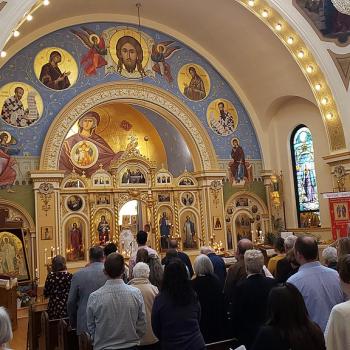 In a famous episode of Christ’s ministry, Jesus turned fives loaves of bread and two fish into a meal fit for thousands:
In a famous episode of Christ’s ministry, Jesus turned fives loaves of bread and two fish into a meal fit for thousands:
Lifting up his eyes, then, and seeing that a multitude was coming to him, Jesus said to Philip, “How are we to buy bread, so that these people may eat?” This he said to test him, for he himself knew what he would do. Philip answered him, “Two hundred denarii would not buy enough bread for each of them to get a little.” One of his disciples, Andrew, Simon Peter’s brother, said to him, “There is a lad here who has five barley loaves and two fish; but what are they among so many?” Jesus said, “Make the people sit down.” Now there was much grass in the place; so the men sat down, in number about five thousand. Jesus then took the loaves, and when he had given thanks, he distributed them to those who were seated; so also the fish, as much as they wanted. And when they had eaten their fill, he told his disciples, “Gather up the fragments left over, that nothing may be lost.” So they gathered them up and filled twelve baskets with fragments from the five barley loaves, left by those who had eaten (Jn 6: 5-13 RSV).
An important reading of this text explains how Jesus, being able to feed the crowd, shows how he is able to feed the multitude of the faithful with the eucharist. This interpretation is easily suggested by John as he put the context of Jesus’ description of himself as being the bread of life (cf. Jn. 6:35), the bread from heaven (cf. Jn. 6:51), as being linked to Jesus’ feeding of the multitude. Many sought after Jesus because of the way he fed the crowd; Jesus said that they should not seek him merely because of the temporary earthly food which he gave, but because he also gives himself to be the food necessary for eternal life:
Jesus answered them, “Truly, truly, I say to you, you seek me, not because you saw signs, but because you ate your fill of the loaves. Do not labor for the food which perishes, but for the food which endures to eternal life, which the Son of man will give to you; for on him has God the Father set his seal” (Jn. 6:26-7 RSV).
While the eucharistic interpretation is important, we must not neglect the lessons being taught by the historical context. While there are times that the historical events are unimportant in relation to the higher, spiritual meaning of Scripture, this is not the case here. Jesus fed the hungry. He gave what they needed not only for eternal life, but temporal life as well. The eucharist, the bread from heaven, is connected with the bread of the earth. The eucharist comes to us out of the bread of the earth. The physical world, and our material needs, remain important. Jesus was not a Gnostic who rejected the value of bodily existence. He affirmed it in the incarnation, showing that our salvation is had in and through the body and not apart from it.
In the story, it was because a boy shared out of the abundance of his earthly goods that the crowd was able to be fed. Jesus took what was given and shared by the boy and multiplied it. As grace perfects nature, so Jesus is able to take what is given and transform it into something greater. The expectation, however, is that we share. That we give what we can to others, making sure their earthly needs are met. This is why the bread, the fruit of the earth, is a part of the bounty which the community gives in order to celebrate the eucharist. It reminds us of the Christian way of life. Jesus feeds us spiritual food taken from the gifts which we have given over to him. What we give, he elevates and makes greater. And as the sign of the eucharist is founded upon the feeding of a hungry crowd, we must realize that to follow the spirit of communion, we must help each other deal with the problem of physical hunger.
Saint Basil did not mince words. When faced with a great famine, how saw how appalling it is to slowly die of starvation: “The disease of those who are starving, namely hunger, is a terrible form of suffering. Hunger is the most severe of human maladies, the very worst kind of death.” [1] Those who have plenty are called to share with those who have little to nothing. Hunger is a real concern for Christians. Whether or not it is physical or spiritual hunger, we are expected to share the blessings we have with others. We are not meant to take the grace which God gives us and hide it away. We are expected to multiply it, and this is done by the way we share it with others. When we give, God multiplies the grace; if we hide it away, holding it for ourselves alone, we risk God taking it away because we have not received it properly.
The spirit of communion, the spirit of the eucharist, is self-giving; it is a spirit which runs contrary to the spirit of capitalism. Jesus gave of himself; we eat of him and partake of his eternal life. He multiplies the gift of himself across the whole of creation as he gives himself out in the eucharist. Capitalism does not know such communion, such self-giving. At best, capitalists give a little, just enough to look good and to keep the capitalistic system going with themselves on top; nonetheless, we must realize such vainglorious deeds to not represent true self-giving. Such so-called acts of charity do not satisfy real charity, as Pope Francis explained:
Capitalism knows philanthropy, not communion. It is simple to give a part of the profits, without embracing and touching the people who receive those ‘crumbs’. Instead, even just five loaves and two fishes can feed the multitude if they are the sharing of all our life. In the logic of the Gospel, if one does not give all of himself, he never gives enough of himself.[2]
The eucharist, the bounty of Christ, the gift of life, is meant to be imitated by us in our self-giving to others. The story of the feeding of the multitude points to communion as it is founded upon the boy’s self-giving for the sake of the crowd. Jesus multiplies and blesses true self-giving, that is, true acts of love which join people together in communion. The eucharist, the thanksgiving feast of Jesus, is intimately connected to its earthly example. Jesus did not place demands on who was to received his bounty. Jesus not teach the crowd how to hunt or cook so that they would not be hungry again. He just took what was given and shared it to the crowd, showing how he works with humanity, multiplying what is truly given out for his sake so that it can satisfy in a way beyond empirical expectations.
The solution to hunger, whether it be spiritual or physical, is not found in the selfish rules of capitalistic economics. It is found in the economy of communion. Just as we must forgive others if we want to be forgiven, so we should bless others with ourselves if we want to receive the full blessings of communion. The rich and the poor alike are called to the feast. The poor, if they have nothing, still give the gift of their presence, a gift greater than all the wealth in the world. The rich, likewise, are to give of themselves just like the poor, to give out of love, which means to share the bounty which they have received if they want to find the bounty of communion multiplied in their lives. The poor are to be welcomed with love, not humiliated because they seemingly have nothing to share because of their lack of material resources:
When you meet together, it is not the Lord’s supper that you eat. For in eating, each one goes ahead with his own meal, and one is hungry and another is drunk. What! Do you not have houses to eat and drink in? Or do you despise the church of God and humiliate those who have nothing? What shall I say to you? Shall I commend you in this? No, I will not. (1Cor. 11:20-22 RSV)
If we want to fix the economy we should learn the lesson of communion and employ it in the way we engage the world. We must stop following capitalism with its idolatry of wealth. Some people will have a bounty of material goods and others will not. Those who do should not deride or think less of those who do not. Not everyone has the will or desire our savvy to seek after material success.
Christians, receiving the lesson of Christ and taking it to heart, should manifest what they receive in communion and bring it to the world. They must seek to transform the world. To do this, Christians must work for the oppressed, to overturn injustice, but they also must do so much more. They have to change things, eliminating what allows for such oppression:
The economy of communion, if it wants to be faithful to its charism, must not only care for the victims, but build a system where there are ever fewer victims, where, possibly, there may no longer be any. As long as the economy still produces one victim and there is still a single discarded person, communion has not yet been realized; the celebration of universal fraternity is not full.[3]
In feeding the multitude, Jesus presented to us a sign of communion. He helps us understand how the eucharist can be given out to the multitude of the faithful throughout time and space by multiplying the material gifts of a young boy, turning his meager food into a feast fit for a multitude. Here, we should learn the way we are to be in the world. We are called to share the graces given unto us. If we do, Jesus will multiply our bounty. If we come together, sharing all we have with each other, we will find that the whole of humanity, indeed, the whole of creation, can have its needs fulfilled.
[Image=Jesus Feeding the Multitude by Alexandr Ivanov [Public domain], via Wikimedia Commons]
[1] St. Basil, “In Times of Famine and Drought” in On Social Justice. Trans. C. Paul Schroeder (Crestwood, NY: St. Vladimir’s Seminary Press, 2009). 84.
[2] Pope Francis, “Address to the Participants in in the Meeting ‘Economy of Communion’” (Feb. 4, 2017).
[3] Pope Francis, “Address to the Participants in in the Meeting ‘Economy of Communion’” (Feb. 4, 2017).
Stay in touch! Like A Little Bit of Nothing on Facebook













